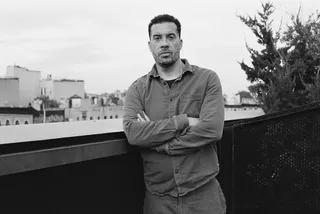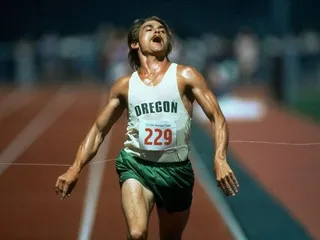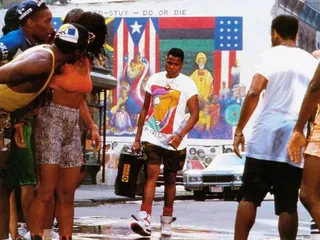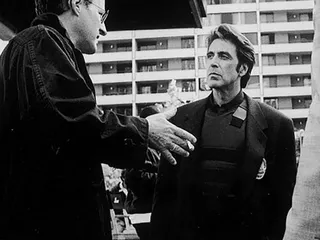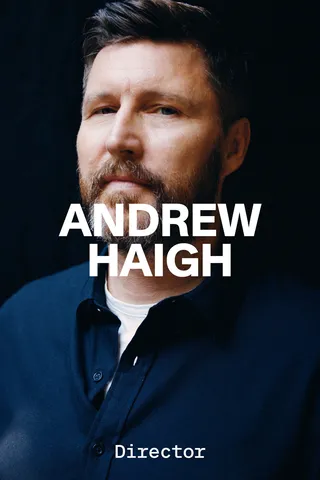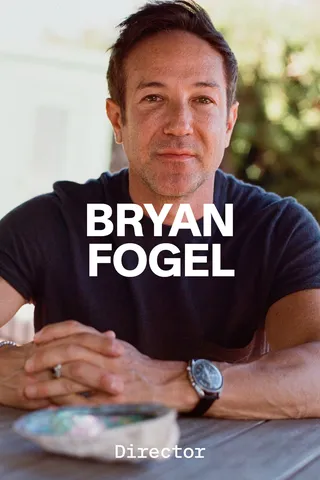Ezra Edelman
Ezra Edelman’s films examine world-shaking events with the intensity and discipline of an elite athlete. As the Brooklyn-based documentarian explains, his work straddles “the intersection between race and sports and politics and journalism.” Raised in Washington, D.C., Edelman is best known for his longform portrait O.J.: Made in America (2016), which won the Academy Award for Best Documentary Feature in 2017. He has also directed or produced critically acclaimed films on Magic Johnson and Larry Bird, the Brooklyn Dodgers, the Stax record label and more. Despite being deemed a “masterpiece” by The New York Times, his most recent project, The Book of Prince—a deep dive into the life and archives of the pop icon, five years in the making—was shelved in 2025 following legal objections from the musician’s estate. Fresh off that experience, Edelman’s film picks for Galerie highlight underdog stories, existential journeys and sharp institutional critiques from directors such as Steve James, Michelangelo Antonioni and Spike Lee. Beyond entertaining, he says, film at its best has the capacity to deepen thinking and alter perceptions. “Quite simply, if it didn’t do that, what’s the point?”
A PERSONAL MESSAGE
my FILM LIST
Click each title to discover our curator’s notes and where to watch
I remember going to see this on a Friday night in a packed theater (the now-defunct Sunshine Cinema in Manhattan), not knowing anything about it. I don’t even think I knew who Antonioni was as a director. I was so taken by the feeling of dislocation that I got from the first 20 minutes. It’s so still, so quiet. Jack Nicholson is a journalist in some African desert—I think he’s supposed to be in Chad—he’s talking to somebody, then someone’s shooting at him, then his Land Rover gets stuck in the sand, and he’s just had it. He throws his arms up as if to say: The universe is conspiring against me. That’s a feeling we’ve all had. Even though you don’t understand exactly what’s happening at that moment, the guy’s clearly unhappy. He’s alone. He’s not getting what he wants. So he’s like, “All right, new deck, new hand—I’m going to assume a stranger’s identity. I’m going to become him.”
Then he realizes that the person whose identity he’s assumed is running guns, yet he decides to lean in further: I’m going to adopt this guy’s purpose even if this is a purpose that I’m clearly unsuited for morally, politically, emotionally. The idea of wanting to live with purpose, even if it’s someone else’s purpose—there’s just something so human about it. There’s something about sitting shotgun to this guy’s literal transformation into another human being. I really felt like a passenger alongside this character.
{{ All Items }}The classic template for the underdog sports story. Sylvester Stallone wrote a movie designed to make himself a star, and you cannot imagine any other person ever playing this role. It’s such a simple movie. The first act is one day and night in Rocky’s life. You meet the characters around him. The audience can all relate to somebody who is down and out, who is struggling to make a living. When we think about the whole cycle of Rocky films, they become much more pop over time—there are more training sequences, more fights, more everything. Mr. T shows up, Hulk Hogan shows up, Dolph Lundgren shows up. The movies become much more “Hollywood,” but when you go back and watch the original you realize this was a great movie because of its simplicity. The whole movie is basically a guy who’s got nothing, who drinks the five raw eggs before he goes out and runs, who punches sides of beef…a guy who just takes so much punishment. That’s his whole thing. He doesn’t want to win the big fight. His whole goal, as he says to Adrian the night before the fight, is simply to go the distance. If he can go the distance and prove he’s not a bum, then he’s done something with his life. Who can’t relate to that?
And then there’s the fight. Rocky is getting the shit beat out of him, and finally, in the 14th round, he gets knocked to the canvas and his corner tells him to stay down. Apollo Creed’s over in the other corner, thinking he’s finally won the fight. He’s finally gotten rid of this tomato can. Adrian comes into the arena and sees her guy down for the count. Bill Conti’s score is swelling. Then Rocky gets up, and you see Apollo looking at him, his shoulders slumping as if to say, “This motherfucker.” I love that moment. It’s so perfect that Rocky doesn’t win the fight. I feel like a schmuck being moved this much by the movie, but it gets me every time. Rocky doesn’t care about winning, he just cares that Adrian is there and he’s finally in love and has found purpose. He loses but he wins.
{{ All Items }}Something I unconsciously took from Do the Right Thing is the need to tell a story from the perspectives of multiple people and have their viewpoints represented. Theoretically, the protagonist of Do the Right Thing is Mookie, but it’s really the neighborhood, and everyone in it has a narrative thread. All perspectives need to be absorbed and empathized with to properly feel the weight and intention (and tension!) of the film. I can’t think of many movies—even now, but certainly any that I had seen then—where there is that emphasis. It’s a mosaic. It’s one day in the life of a single neighborhood, but it really feels like a portrait of America at that time.
Do the Right Thing came out in July 1989; I turned 15 that August. It just split my brain open. I now have seen it so many times, revisited it in so many different eras of my life, that I’ve almost evolved with it. Talk about a movie that really affected my worldview and how I tell stories! First, the empathy: Here’s a story about the racial cauldron that is America, that is Brooklyn, during the summer of 1989, told through the lens of Spike Lee, the most prominent Black filmmaker in America. And yet he tells a story that is, while primarily about the Black residents of the Bedford-Stuyvesant neighborhood, also about the Italians and the Koreans and the Latinos that make up the hood (and the one white guy in his Larry Bird T-shirt). And the three Caribbean dudes sitting on the corner, one of them named Sweet Dick Willie, cracking jokes. It’s a play but also a cinematic opera. You get to live with these characters, be moved by these characters, care about these characters, laugh at these characters, laugh with these characters. And then to see how it all plays out. You have this group of folks together, all perspectives are included, and there’s a real humanity with which he imbues the respective groups and individuals within them. No one’s pure, no one’s the hero, no one’s a villain. Almost everyone does things that you might recoil from after you’ve already leaned into them. You’re never fully stabilized or settled, which is why the movie is so alive.
When Spike Lee made this, Hollywood was not exactly teeming with Black directors. Here was a Black filmmaker making films about Black people and defiantly Black subject matter. He was telling these stories unapologetically. He wanted to provoke. He had the courage to put these stories out there—for Black audiences but also for white audiences—and revel in the cultural chaos that ensued. Do the Right Thing was so controversial. People thought it was dangerous. I remember Spike saying something like, “The amount of times people have asked me, ‘Should Mookie have thrown the trash can through the window? Did he do the right thing?’” And he was like, “No Black person ever asked me that.”This movie fucking blew my mind. I didn’t know what I was getting into. But I cannot even begin to dissect it without talking about the last shot. This 12-year-old boy has just gone through hell and back orchestrating a coup to turn three rival drug dealers against one another so he can free his addicted sister from the bonds of a kingpin, played by Giancarlo Esposito. The whole movie, you’re not exactly sure what is happening. The only time he sees his father, played by Samuel L. Jackson—who’s probably in every single movie that I’ve put on my list—is when he plays chess with him in Washington Square Park. By the end, you’ve come to understand that chess is the metaphor for this movie, based on how they talk about chess and how he has organized this whole plan. This kid is such a G: He has organized and carried out his plan without emotion, being discreet and alone at every turn. Yet he’s done it all with steeliness. And when the tears flow down his cheek in that last shot, you realize that he’s just a kid. He is just a boy. There’s something about it that’s just perfect. The whole time the narrative is unfolding, you’re never quite sure what he’s doing or why he’s doing it. But when he shows up at the end to play chess one more time with his pops, you finally understand: This kid has put all the pieces together to knock ’em off the board. He took out the rooks and the knights and then the king, and he protected his queen. That’s what’s been happening this whole time. And because he’s 12, no one’s the wiser.
{{ All Items }}This is just two kids, their families and their trajectories. It is hard to watch this movie and not feel everything again. Because we all want to make it, we all want to be something or somebody. Steve James chronicles two kids—one of whom grew up in the Cabrini-Green projects, the notorious housing projects in Chicago that have since been torn down—and there wasn’t much for them to strive for. They both are basketball players, and their dream is to make it in the NBA. But the movie is really a portrait of the way the world works over four years in the late 1980s and early 1990s. You follow the trajectory of these kids from the time they’re 14 years old through high school. They both have potential, and you see how that potential is realized or not realized. You get all the bullshit of how this world works. One kid, who seems to have more potential, has his tuition paid for. The other kid seems to have less potential, he hasn’t grown into his body yet, so as a result he doesn’t get the same educational advantage. You get to live through the characters while also bearing witness to the forces that tamp down on them from above: coaches, the educational system, the government, the neighborhood, everything. It’s heartbreaking to watch, because they’re two amazingly charismatic kids. And you get to live not only with them but also with their families, whether it’s Arthur’s father, who has struggled with drugs, or William’s brother, who had his own hoop dreams but didn’t have the discipline to realize them.
What a gift Steve James gave us. The patience that it took, the amount of time spent following these kids, the vigilance—it’s astounding. You think of the 7 Up series, but checking in with characters every seven years is a whole different exercise. A lot of stuff happens with these kids, and Steve obviously has to choose what to focus on, but by and large he’s there for everything. The way it’s laid out, you think one kid’s going to win and the other kid’s going to lose. But the kid who goes to the public school in Chicago ends up making it to the place the other kid couldn’t. This kid who is supposed to be the star quits the sport and never really has a career. You could have never predicted this through the course of watching this movie, let alone shooting it. Steve was gifted this material from the story gods to make this movie what it was. And it becomes perfect because of something that he could have never predicted. You’d be fucking crazy to want to make a movie like that.
{{ All Items }}This is Robert Towne—he wrote Chinatown, the best screenplay of all time. The guy knew his way around a typewriter. Billy Crudup is magnetic as Steve Prefontaine. It’s the confidence—the way Crudup’s Pre goes through the world like the cat’s meow. His performance is balanced out and heightened by Pre’s dynamic with the track coach at the University of Oregon, Bill Bowerman, played by Donald Sutherland. What elevates the movie beyond Crudup’s performance, beyond the dynamic between Pre and Bowerman, is the life philosophy. What’s Pre’s superpower? He can take more pain than any person he runs against. But he has to be the front-runner—maybe for his ego, maybe for his psyche. Whereas the science, which is what Bill Bowerman cares about as the coach, says that there’s a smarter way of running a race. The battle of minds and wills between these two guys is what makes the movie. In some ways, Pre bends Bowerman to his will. A good coach, just like a good filmmaker, can have an idea about something, but the best idea should win. If you have an immovable object, then maybe don’t try to move it.
I love that Towne also figured out a way to infuse politics in here—the politics of amateurism, that these athletes were subject to Byzantine rules and not free to compete as they saw fit. There’s a scene at the 1972 Olympics in Munich, after the terrorist attack, where Bowerman makes an impassioned speech to the U.S. track-and-field team about why competition is important, why the Olympics exist in the first place, and the privilege and the right of competing. That speech nails why sport matters, and that’s a question I’ve been thinking about my entire life.
{{ All Items }}One Day in September came out in 1999, so I was 25. It was during this period of time when I was watching things that were really informing who I was and what I wanted to do. On the one hand, it’s a simple movie, in that it’s a documentary retelling of the events of September 5, 1972—the terrorist attack at the Munich Olympics that resulted in 11 Israeli athletes being killed. You learn a lot about Germany’s security laxness and the historical and political context in the country that helped enable the tragic events. But what I really took from the movie was its marriage of sport and politics, how it took this tragic event and dissected it through this medium. It was done journalistically, with real attention to capturing varying perspectives, be it the widow of one of the slain Israeli athletes, the Israeli secret service or, most notably, one of the terrorists whom that same secret service had never been able to find—but director Kevin Macdonald somehow did. I was very impressed by that. You felt like you were watching a film that had the necessary perspectives to tell the complete story of the events, rather than simply from the perspective of the victims and/or the world at large.
I’m a huge sports fan, and at the time I saw this, I had just started working at HBO’s Real Sports, but I had always been very insecure about my sports fandom, because sports is thought of as the toy department. Even though it’s what I love most, I always felt I had to do something more important or more substantial with my life. But here was a movie that was telling a story about something important that took place within the sports world but had a great impact far beyond it. Not only was it well told but it had a stylistic flair. Yes, it’s documenting a horrible, tragic event, and the experience of watching it is sobering, but it’s still entertaining within that sobriety. It really showed me how a serious topic could be done in an entertaining way. Put some sugar in the medicine and you can do both. That’s something I’ve strived to do in my work. There should be hip music cues, there should be humor. This movie’s not at all funny, but there are things that grease the wheels of its viewing. It arrived at a specific moment in my life and helped set me off on a trajectory. It propelled me to a place that otherwise I don’t know I would’ve arrived at on my own.
{{ All Items }}This movie is about Russell Crowe’s character, Jeffrey Wigand, blowing the whistle on Big Tobacco and the implications of that decision. It’s like the worst cautionary tale about telling the truth. You have Al Pacino playing Lowell Bergman, the renowned newsmagazine producer and liberal stalwart, who wants Wigand to come on 60 Minutes. It’s all about the dance of getting this guy in the chair. It’s so exhausting and sometimes heartbreaking—the wooing of a subject, getting someone to talk. Not exerting pressure, not manipulating them, but gently leading them to that place. This movie captures the way that every moment of forward progress is met with a fucking brick wall. You think you can leave Big Tobacco and then go be a consultant for CBS News? No, they’re going to come after you. They’re going to really come. I know why I feel so impassioned when I watch this movie: because it’s about telling the truth—the importance of telling the truth, the price of telling the truth, and the basic fucked-up capitalistic forces that prevent the truth from being told. That is always a relevant story.
There’s a moment in the movie that makes me cry every single time. Wigand’s life has been destroyed: His wife left him, he’s got these two little girls, and there’s this heartbreaking phone call where Al Pacino’s character has to tell him his interview is not airing. And he is like, What? What I did was for one reason: to show my daughters. He just repeatedly yells, “I told the truth.” It’s the one thing you’re told as a child: Tell the truth, the truth will set you free. And this movie is like, “Nope, sorry. It doesn’t work that way.” Finally, almost two and a half hours in, after Al Pacino has created the space to finally have the segment air as intended, Crowe’s in a shitty little apartment with his two girls, cooking them spaghetti dinner on a Sunday night. The TV is on, and we see 60 Minutes, the famous tick, tick, tick, tick of the intro. And then you see Wigand for the first time on the TV, and his little girl looks up at him—I’m almost going to cry right now. It just gets me every fucking time. It’s like, that’s why you do it.
{{ All Items }}Do the Right Thing and Malcolm X are going to be on everyone’s list of favorite Spike Lee movies, but after that it’s a bit of a crapshoot (shout out to Mo’ Better Blues and Inside Man). I also put Bamboozled on here, which is not a movie most people consider to be one of his best. It was overlooked when it came out. Shot digitally, it looks kinda weird. But who else has the cojones to convince a studio to make a movie that points the finger at the television industry and its white power structure and asks: Who the fuck are you and what do you care about? These are the images about Black people you’re putting on? Black people are all minstrels to you, so I’m going to make a movie that puts my finger on this very real truth about our culture. I remember being so jazzed by it when I saw it.
We have an all-white power structure, a white boss who claims to be Blacker than the Black character—Pierre Delacroix—right in front of him, an all-white writers room tasked with writing a Black minstrel show. Delacroix, played by Damon Wayans, is trying to make a point about the depictions of Black people on TV, but then gets seduced by the unlikely success of the monster he created. Where’s the line? What’s actually offensive? What do white people find offensive and what do Black people find offensive? Spike Lee is a film professor, and he figured out a way to make a movie where he can dissect the imagery of Black people in movies going back a century. It’s his way of, through his art form, discussing minstrelsy, this really sordid history of how we’ve been entertained by these debased images of Black people and blackface, but doing it inside this very modern, mainstream story. It’s brilliant. It just kills me that this movie has been so underserved within his canon. In terms of a critique of the world, it’s so spot on. All his work goes through, not around, these racial issues we experience in America. I’m not sure any other filmmaker would have the balls—or the clout—to do this. Audacity is his defining trait as a filmmaker, and I fucking love him for it. Spike knows how to tell the truth about us, and true to form, you come out of that movie thinking about your own complicity in how you absorb images. If you trace Spike’s career, he played a huge part in the evolution of how Black characters are depicted on the screen beyond his movies. Twenty-five years on, I hope this movie is reconsidered and reabsorbed.
{{ All Items }}Is it a business movie or is it a sports movie? Michael Lewis wrote a book called Moneyball, about how the Oakland A’s and Billy Beane, their general manager in the early 2000s, pioneered a philosophy that uses statistical analysis to challenge the traditional way that baseball players are evaluated. And because the Oakland A’s were a small-budget team that had a hard time competing with the big-budget teams like the New York Yankees, it’s also a David versus Goliath story. What Bennett Miller does very smartly is pit the New York Yankees’ $120 million payroll against the Oakland A’s $40 million payroll. The idea that you can make a movie about numbers that is so propulsively entertaining is astounding.
Moneyball has the perfect mix of the present narrative, Beane’s backstory, and archival footage from actual games. There’s a moment when Scott Hatteberg hits a home run to win their 20th game in a row, which was the longest streak in American League history. You see him running around the bases, and the splicing of the archival footage of the real Hatteberg with Chris Pratt’s Hatteberg is perfect. The way that the information is doled out, every scene leads to the next theme in a way that’s so intellectually rigorous and satisfying that it just transcends. Moneyball is wonky, and it shouldn’t work, yet it’s perfect. You feel all the feelings in these small moments of deliverance. The editing of the movie is brilliant. You have swells and then stillness alongside the day-to-day of looking at numbers, looking at computers—just a perfectly realized world. The production design is great. Also, I don’t know what the real Billy Beane is like, but what would Moneyball be without Brad Pitt? It needed this kind of Hollywood movie-star performance to anchor it with charisma. He gives a performance where he’s vulnerable and you really feel the character is out on a limb. So, in the end, it’s a sports movie and a business movie—but most importantly, it’s a life movie.
{{ All Items }}
“It’s so perfect that Rocky doesn’t win the fight. I feel like a schmuck being moved this much by the movie, but it gets me every time.”
RELATED MATERIAL
Essays, interviews and other connections
![Ezra Edelman: Olympic States]() Ezra Edelman: Olympic Statesread
Ezra Edelman: Olympic StatesreadThe director and sports fanatic highlights a biopic, a documentary and a narrative feature—all made by Oscar-winning filmmakers—that create a prismatic portrait of the 1972 Munich Olympic Games
By Caroline McCloskey
![Speaking Volumes]() Speaking Volumesread
Speaking VolumesreadIn Spike Lee’s masterpiece Do the Right Thing, cultural prophecies resound from the sidewalk
By Ivy Pochoda
![Michael Mann’s Outlaw Sublime]() Michael Mann’s Outlaw Sublimeread
Michael Mann’s Outlaw SublimereadThe stylized poetics of Michael Mann’s burdened masculinity
By Christian Lorentzen
